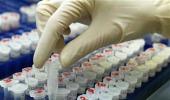Pharma companies gear up for the 'new normal' as they train and align their sales forces for a paradigm shift. GSK leads the charge with staggered return-to-work, others plans yoga sessions and health care webinars for salesperson's family.

Soon a medical representative (MR) wearing full protective gear would knock on a clinician's door, trying to explain the efficacies of his drug brand.
Pharma companies gear up for the 'new normal' as they train and align their sales forces for a paradigm shift.
British multinational firm GlaxoSmithKline Pharmaceuticals (GSK) is one of the first companies to launch its sales force in field since the coronavirus crisis broke out.
Starting Friday, May 8, the company has initiated a staggered return-to-work for its field force in the 'green-zones'.
This would be about 15-20 per cent of GSK's 3,500-strong field force.
A company spokesperson said, "Field-based colleagues in the remaining zones and all office staff continue to work from home.
"With most of our workforce being field-staff, GSK is equipping them with necessary safety and hygiene gears including personal protection equipment."
Others are gearing up too.
Most pharma companies have come out with their own set of protocols for the field staff, largely on similar lines.
"Dr Reddy's has come out with a pretty comprehensive set of guidelines for the staff - both at field and at home.
"We have circulated that among all our member companies and everyone is drafting their individual plans," said Sudarshan Jain, secretary general of the Indian Pharmaceutical Alliance which represents India's large pharma firms.
Some of the basic guidelines include wearing masks, gloves, face-shields when interacting with external stakeholders (doctors, stockists, chemists), supplying the employee with the safety kit (at least two to three months supplies), webinars for the entire family of the employee explaining them about the safety measures, self fever check regularly.
Physical visits to doctors to reduce - only one initial visit that would be followed up by virtual and tele-calls.
MRs have been asked to avoid their regular laptop bags, and carry tablet phones in pouches.
Companies are putting a lot of emphasis on employee well-being.
In fact, DRL's guidelines insisted on 'work-life balance', no work beyond stipulated hours and also sticking to proper lunch habits.
Regular counselling and yoga sessions for families of the field employees on the cards.
There would be some certifications (Red Cross etc) for employees to ensure that they have clearly understood the safety guidelines.
Branded mask and face shields are definitely on the cards, claim multiple companies.
The human resources head of a Mumbai based firm that has significant presence in acute therapy drugs said that a sick employee is not productive.
"All employees are stressed now. For more than a month now the field staff has not got their daily allowances.
"Now they are raring to go and we want to make sure that they do not overdo things in enthusiasm," the person explained.
The India business head of a large firm said that he did not expect the field force to be fully deployed before a few months as restrictions around meeting doctors is likely to remain.
"There can be no hospital visits at all. Even the private practitioners would not be comfortable meeting MRs now.
"So, things would be normal only when the patient flow to the clinics become normal," he said.
The official also added that with the focus on digital tools, a certain skill-set would be necessary in the field force.
This could eventually lead to some rationalisation of the field force.
"As of now, not many companies are thinking of lay offs just yet.
"This is because they have saved considerable budget that they would have otherwise spent in conferences and travel of staff.
At first, these funds would be redeployed to create digital tools," said a senior officer.
Photograph: PTI Photo












 © 2025
© 2025